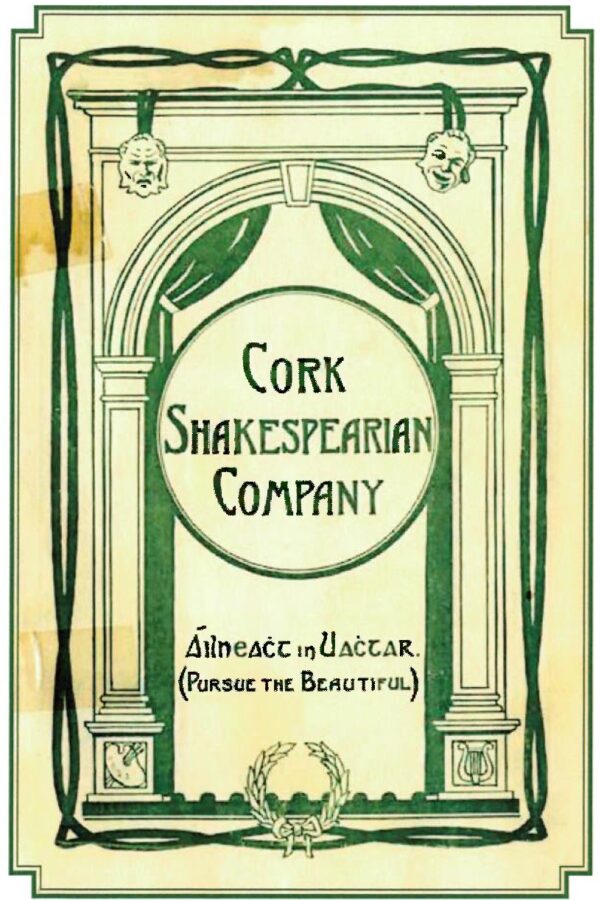
Kieran’s Our City, Our Town Article,
Cork Independent, 30 January 2025
Making an Irish Free State City – Pursuing the Beautiful in Drama
From 1927 to 1932 Fr O’Flynn and his Cork Shakespearean Company were a highlight of the annual programme at Cork Opera House. Over the six week long programmes, eighteen different Shakespearean plays were presented. The time and effort into rehearsals and financial investment into costumes and venue hire were high.
Despite the challenges the Company remained steadfast in its ideals of Irish culture as something that should be supported to grow and open to all citizens to engage with. For example, in a 1930 season Programme for Cork Opera House, Fr O’Flynn condemned the censorship of the Irish government by using the metaphor that more lights need to be lit for culture more than establishing darkness in Irish culture. It was a nod to the State’s first Censorship of Publications Act of 1929; “To put out the darkness strike a light. Better for a nation’s organisations to establish Culture than organisations to prevent what is degrading. Vigilance Committees and censors and uproar in this Country show that the Irish people’s minds are idle. As with the individual, its government (the will) takes care to flood the soul with light when darkness would possess it, so with the nation, the Government should consider the negative goodness of prohibitive legislation worthless as compared with striking the light of Culture”.
In the late November 1931 Cork Opera House week long season, one of the most entertaining of all the Shakespearean comedies – King Henry IV, Part 1 – was performed. The proceeds that the show made were handed over to the Society of St Vincent do Paul as an offering to help in the noble work of the Society for the “relief of distress and want in the city”.
The Cork Examiner on 27 November 1931 remarked that the Cork Shakespearean Company’s version of the play was growing in its comedy and story-telling; “The company have never exceeded the standard of perfection shown in their previous performances of this play, and consequently the rich humour will be fully reproduced, as will also the nobility of more than one great figure. The character of Falstaff is outstanding in classical literature, and even now his wit and nimbleness of tongue can delight more thoroughly than many a famous cinema comedian. It is a play that well merits study, and nobody, who goes to it will have the slightest ground for regretting his choice”.
The November 1931 season concluded with The Merry Wives of Windsor. The Evening Echo on 30 November 1931 details that the Saturday matinee provided an additional angle to the work of the Cork Shakespearean Company. On the Saturday afternoon they presented a very varied and thoroughly Gaelic programme, which drew on everything from the poetry of Pádraig Pearse to presenting pieces from Irish playwrights.
The Evening Echo continues to praise the several productions of the 1931 week especially in the face of growing cultural trends such as cinemas. The editorial remarked: “This group of amateurs in the city continue to pursue an art that has everything to commend it. Had they been operative in a previous generation their work would have been ever so much easier, and encouragement, far more than the present day quantify, would have been bestowed on them. All the greater, then, is their triumph, when, in face of all the opposing forces of the modern types of entertainment. They are still able to carry on and can find audiences big enough to enable them to pay their way”.
At the conclusion of the performance on the Saturday night Mr Henry McCarthy, on behalf of the Company, thanked those present for their kind patronage throughout the week. He outlined that the patronage had enabled them to do more, than clear their expenses, and, although they did not gauge the measure of their success by the box-office receipts, it was always encouraging to receive such support. He remarked that their work on this occasion had been a labour of love, and if they had helped or given real enjoyment to a few they were satisfied with the outcome of their efforts. Mr McCarthy remarked that if the country was to continue on prosperous lines the Irish must support, everything produced at home – everything both intellectual and material; “We look confidently for support from the citizen. Our culture and civilisation are threatened on every side, and we must do our best to retain them in Ireland. To regain our Christianity we must begin at home on cultural lines”.
At the end of the 1932 season in Cork Opera House. Fr O’Flynn spoke himself from the stage to the audience. He reiterated the motto of the Cork Shakespearean Company “An Áilneacht in Uachtar”, which he translated as ‘pursue the beautiful’. He referred to a time in the world when people found life and happiness in seeking and contemplating the beautiful. He related that for centuries now the world looked for happiness in making money. He called it the “practical way”; “This practical way has caused the present state of life; it has poured the sweet milk of concord into hell. The company knew that the so-called practical way spelled decadence. Hence, they seek and appreciate appreciation and not the making of money. They could easily make money by playing the things of plots and thrills that nowadays fill the boxes. Or they could visit Liverpool or Manchester, get a good Press, and return to be followed. They preferred the way they have chosen: the way of hard work on their part, and the approval or disapproval of those who come to hear them”.
To be continued…
Caption:
1289a. Front cover of Cork Shakespearean Company programme, 1928 (source: Cork City Library).